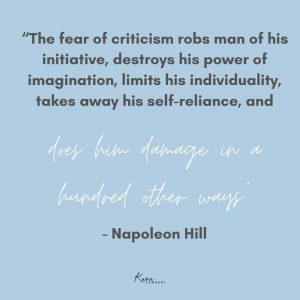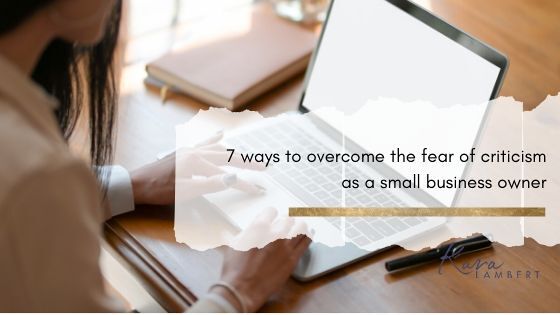The fear of criticism, probably one of the most common reasons small business owners tell me when discussing why they have trouble promoting their business.
Why do we fear criticism?
It’s true that our mind plays tricks on us and it’s there to protect us. When it comes to fearing criticism there are two key tricks it uses:
– Fundamental Attribution Error
– The ‘Jerk’ Factor.
Fundamental Attribution Error & fear of criticism
In a nutshell, this trick is where our brain will downplay our own abilities. Essentially, we think less of ourselves than we do of others. When it comes to putting ourselves or small business out there, the fear of criticism is triggered by the Fundamental Attribution Error as we think we’re not good enough compared to others and we just don’t want people to point that out.
The ‘Jerk’ Factor & fear of criticism
No, I don’t mean that all the people out there are jerks, or that they are for criticizing us, more that we tend to go with the person who is the jerk than the likeable one. Now consider that our brain is already telling us that we’re no good, that puts us in the ‘jerk’ role. All the more reason not to fear criticism of you and/or your small business.
How do we overcome the fear of criticism?
Everyone is different and we all have our own stories and own drivers that determine why we fear criticism, what I want you to have is a tool kit for you as a small business owner, so that you can promote your business.
1. Who do you fear criticism from & do they deserve it?
I’m writing this one first because it’s my biggest problem. I give far too much credit, thanks Jerk factor, to people who really don’t deserve it.
TIP: Too often we, me included, give our energy to people who don’t deserve it, not because they are ungrateful or treat us poorly, but because they’re not on the same playing field.
Brene Brown, first in her 99U speech, spoke about the people in your arena and not paying attention to the people who aren’t doing the work, aren’t down in the dirt, aren’t getting their arses kicked.
If the people your fear will criticise you are not in the arena, then they haven’t earnt the right to criticise.
2. When the fear appears only in certain places or times
 This was also me. I used to fear criticism most online. I had a bad run with a troll in the first year of my business. They had me questioning everything I did and my abilities. I was a wreck.
This was also me. I used to fear criticism most online. I had a bad run with a troll in the first year of my business. They had me questioning everything I did and my abilities. I was a wreck.
Then my business coach made a suggestion. Write down the names of 3-5 people who are in the Arena, see point 1 above, on a little piece of paper and keeping it under my keyboard. Whenever I was feeling fearful, I pulled out the list and looked to see if the name of the person I was fearing was on the list – if not, their opinion did not matter.
It may not be that you fear criticism online, wherever you feel the fear, have your list. You could have it in your purse, wallet, or pocket. Eventually, your list will be memorized and you will be able to mentally refer to it.
And eventually, you won’t need the list very much, if at all.
3. When social media triggers your fear
I admit that I have a love-hate relationship with social media and sometimes it goes to I love to hate it. Either way, it’s a necessary part of promoting my business (and there’s a good chance you’re the same).
There are a few ways you can help yourself & your business if it triggers your fear of criticism:
– schedule your posts (and I’ve got something to help with that too)
– use your list of people from point 2 (that’s what I did)
– take apps off the phone, particularly easy if you schedule
– limit your time online
4. Consider why they are criticising you or your business
It comes down to if the person is trying to help, or are they just being a jerk? (Yes, I mean in the real meaning and what I mentioned at the start)
The well-meaning critic
Having managed staff, locally and remotely, I can honestly say that providing feedback (and criticism) remotely is hard. We can’t hear tone, see body language, or get a chance to interject. Then there’s the issue that not everyone is great at giving feedback. (And the feedback sandwich is now the equivalent of a “yes, but”)
TIP: This is when you need to dig really deep, flip your perspective to their’s, and perhaps even ask someone on your list to give their perspective.
The heckler critic
When it comes to people who just don’t have a nice or constructive thing to say, just look to see if they made your list or are in your Arena – there’s a good chance they’re not. If they’re not, don’t waste time or energy on their criticism.
5. Being ok with being vulnerable & having boundaries
Ok, so they may seem contradictory but please stick with me.
Vulnerability and fear of criticism
It does take a certain willingness to accept that criticism will come with business. Here are some truths I’ve learnt, especially when it comes to vulnerability:
– people are generally good
– your customers and fans will have your back, especially when you’re vulnerable
– anyone who doesn’t have your back was never going to be a customer and doesn’t matter
– your presence online will repel people, that’s the intention of marketing and you shouldn’t want to be all things to all people.
Boundaries and fear of criticism
You do need boundaries in your small business. They help you in so many ways, when it comes to criticism though, boundaries:
– protect you from jerk critics and hecklers
– show self-respect
– teach people how to treat you
– teach you what you’re prepared to accept
– are necessary for growth.
6. Strong Values to keep you on track
 I am a big believer in playing the long game and the end game. These beliefs mean that minor distractions, like criticism or the fear of it, are speed bumps and not derailments. But the one thing that helps playing the long game is being firmly grounded in my values.
I am a big believer in playing the long game and the end game. These beliefs mean that minor distractions, like criticism or the fear of it, are speed bumps and not derailments. But the one thing that helps playing the long game is being firmly grounded in my values.
Understanding, speaking & behaving from my values, and in particular my core value, keeps me focused and grounded. I am fortunate, and equally struggle, with the fact that my core value is courage. That means that when I am authentic to myself, my business, and most importantly my customers I MUST act from a place of courage.
The thing is, that when you act from your core values and that they are what drive your actions, you can not be impacted by fear. Why? Because fear is our most basic of drivers and values sit above them.
7. Unpacking your story around your fear
Ok, so this is where I play devil’s advocate.
TIP: Your fear of criticism is based on the stories you tell yourself, drawn from what people have told you, what you’ve experienced, and/or what you have told yourself.
They may not be true.
Your brain hates gaps and silence and it will draw on your stories to fill them.
Thing is, they’re stories and not always facts.
Stories other people told you about yourself are their perspectives on you based on how they view you at one point in time through their lens of experience & the stories they heard.
The stories you tell yourself can be a mixture of and interpretation of what you heard from others or what you believed was the right thing to do (I used to be afraid of public speaking because I believed everyone is/should be).
Your lived experiences, and especially your memories of them, are tainted by time, what other things you hear about the experience, how you felt at the time, and the stories you tell yourself.
I hope you can see how unlikely they are to be based in fact or to be objective. That means that your fear can be a lie, like mine of public speaking, through to a fairy tale/fable of someone else’s perspective trying to sway your actions. Either way, they’re not real and shouldn’t be given much credit.
I hope this list helps you to overcome any fear of criticism you have in your business. I know I haven’t spoken about its roll with staff. If this or any of the other items I’ve shared here has left you wanting more, then please comment below and I will reply, email me, or book a time for us to have a virtual coffee. Any which way, I want to help.

